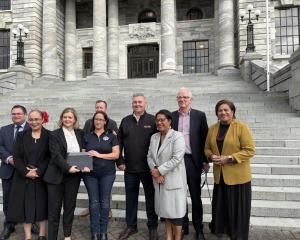
Christchurch competitor Brooke Hudson (17) was pulled under by a strong current on one of the crossings of the Arrow River and had to be rescued by other riders.
Marshals later rerouted the 47km mountain race - on high country between Wanaka and Arrowtown - to a different finishing point, avoiding final river crossings.
''I was carrying my bike through water about chest deep,'' Miss Hudson said.
''I had it over my shoulders but it fell down and went in the water.
''The water twisted round me, wrapped round me, and pulled me down with my bike tangled round me.
''It was pretty scary. I floated down a bit, about six metres maybe, lost my bike and managed to grab on to some rocks. I stopped just before the river got worse.
''Then just before I let go, one of the other riders grabbed my arm,'' she said.
Hudson was pulled from the river, she thought at the fourth to last crossing, by a man named Ewan and some others. Her bike was retrieved by other riders.
She believed Saturday's race organisers should have placed marshals on every river crossing and acted earlier.
The diversion was put in place 2km up the Arrow River from the finish, at the bottom of Soho Creek, about 11am. The race started in Wanaka at 8am.
''It was getting pretty dangerous, horrible conditions overall. There should be marshals on every crossing.''
Hudson got back on her bike to finish third in the juniors, despite facing four more crossings.
''I was in shock afterwards. It was scary after what had happened. When we finished, people told the marshals I'd gone under.''
The 11th Motatapu was organised by experienced sports events management firm Lagardere Unlimited Oceania (LUO), whose inaugural Queenstown Marathon late last year was also run in extremely testing conditions.
LUO chief executive Dave Beeche said, ''Obviously, health and safety of the athletes is absolutely paramount in events like this.
''We take it very seriously and that's why we have contingency plans and management plans.
''We'll review whether we need marshals on every crossing. We'll debrief on the whole weekend and take the learnings from it.
''It's the first year there's ever been any issues with crossing rivers and we took appropriate action at the time.''
Mr Beeche said they had people upriver, near Macetown, giving real time data on river levels.
''River levels come up and down very quickly in environments like these.
''There's a certain element of adventure in mountain based events and it's always a fine balance in retaining some sense of that but keeping everyone safe, which is the top priority.''
More than 4500 registered for the back country races, including the mountain bike, a 42km marathon, a 64km triathlon, 15km run, along with team and solo adventure four peak traverses.
St John Ambulance treated 40 people on the course and 70 at the finish for a range of minor injuries. Four were airlifted to Queenstown Lakes District Hospital - two with leg injuries, one with a back injury and another with moderate concussion.
St John Central Otago territory manager Kelvin Perriman said: ''Overall, we're very happy with how it went. The event organisers run a very professional and safe event.''
Advertisement












